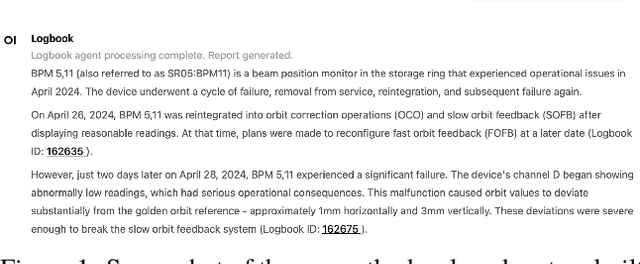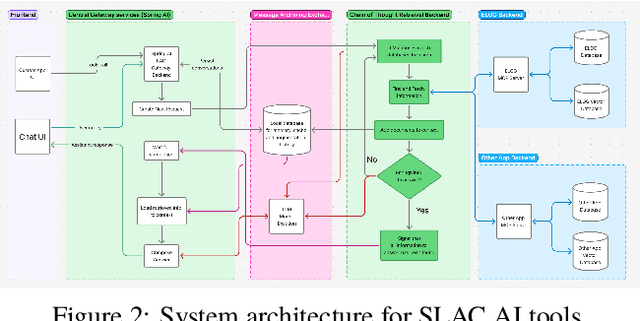Thorsten Hellert
From Natural Language to Control Signals: A Conceptual Framework for Semantic Channel Finding in Complex Experimental Infrastructure
Dec 21, 2025Abstract:Modern experimental platforms such as particle accelerators, fusion devices, telescopes, and industrial process control systems expose tens to hundreds of thousands of control and diagnostic channels accumulated over decades of evolution. Operators and AI systems rely on informal expert knowledge, inconsistent naming conventions, and fragmented documentation to locate signals for monitoring, troubleshooting, and automated control, creating a persistent bottleneck for reliability, scalability, and language-model-driven interfaces. We formalize semantic channel finding-mapping natural-language intent to concrete control-system signals-as a general problem in complex experimental infrastructure, and introduce a four-paradigm framework to guide architecture selection across facility-specific data regimes. The paradigms span (i) direct in-context lookup over curated channel dictionaries, (ii) constrained hierarchical navigation through structured trees, (iii) interactive agent exploration using iterative reasoning and tool-based database queries, and (iv) ontology-grounded semantic search that decouples channel meaning from facility-specific naming conventions. We demonstrate each paradigm through proof-of-concept implementations at four operational facilities spanning two orders of magnitude in scale-from compact free-electron lasers to large synchrotron light sources-and diverse control-system architectures, from clean hierarchies to legacy environments. These implementations achieve 90-97% accuracy on expert-curated operational queries.
Alpha Berkeley: A Scalable Framework for the Orchestration of Agentic Systems
Aug 20, 2025Abstract:Coordinating workflows across heterogeneous control systems remains a central challenge in safety-critical environments such as scientific facilities, industrial plants, and energy infrastructures. Language-model-driven agents offer a natural interface for these tasks, but existing approaches often lack scalability, reliability, and human oversight. We introduce the Alpha Berkeley Framework, a production-ready architecture for scalable agentic systems that integrate conversational context with robust tool orchestration. The framework features dynamic capability classification to select only relevant tools per task, a plan-first orchestration model that generates execution plans with explicit dependencies and optional human approval, context-aware task extraction that combines dialogue history with external memory and domain resources, and production-ready execution environments with checkpointing, artifact management, and modular deployment. We demonstrate its versatility through two case studies: a tutorial-style wind farm monitoring example and a deployment at the Advanced Light Source particle accelerator. These results establish Alpha Berkeley as a reliable and transparent framework for agentic systems in high-stakes domains.
eLog analysis for accelerators: status and future outlook
Jun 15, 2025

Abstract:This work demonstrates electronic logbook (eLog) systems leveraging modern AI-driven information retrieval capabilities at the accelerator facilities of Fermilab, Jefferson Lab, Lawrence Berkeley National Laboratory (LBNL), SLAC National Accelerator Laboratory. We evaluate contemporary tools and methodologies for information retrieval with Retrieval Augmented Generation (RAGs), focusing on operational insights and integration with existing accelerator control systems. The study addresses challenges and proposes solutions for state-of-the-art eLog analysis through practical implementations, demonstrating applications and limitations. We present a framework for enhancing accelerator facility operations through improved information accessibility and knowledge management, which could potentially lead to more efficient operations.
Towards Agentic AI on Particle Accelerators
Sep 10, 2024Abstract:As particle accelerators grow in complexity, traditional control methods face increasing challenges in achieving optimal performance. This paper envisions a paradigm shift: a decentralized multi-agent framework for accelerator control, powered by Large Language Models (LLMs) and distributed among autonomous agents. We present a proposition of a self-improving decentralized system where intelligent agents handle high-level tasks and communication and each agent is specialized control individual accelerator components. This approach raises some questions: What are the future applications of AI in particle accelerators? How can we implement an autonomous complex system such as a particle accelerator where agents gradually improve through experience and human feedback? What are the implications of integrating a human-in-the-loop component for labeling operational data and providing expert guidance? We show two examples, where we demonstrate viability of such architecture.
PhysBERT: A Text Embedding Model for Physics Scientific Literature
Aug 18, 2024Abstract:The specialized language and complex concepts in physics pose significant challenges for information extraction through Natural Language Processing (NLP). Central to effective NLP applications is the text embedding model, which converts text into dense vector representations for efficient information retrieval and semantic analysis. In this work, we introduce PhysBERT, the first physics-specific text embedding model. Pre-trained on a curated corpus of 1.2 million arXiv physics papers and fine-tuned with supervised data, PhysBERT outperforms leading general-purpose models on physics-specific tasks including the effectiveness in fine-tuning for specific physics subdomains.
 Add to Chrome
Add to Chrome Add to Firefox
Add to Firefox Add to Edge
Add to Edge